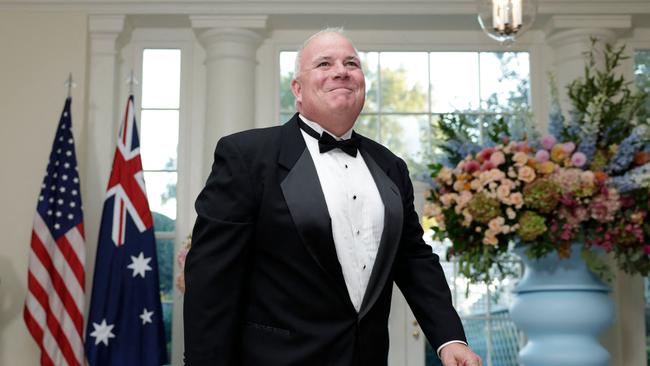‘Industrial bastardry’: CSL’s secret plan to cut pay, sack staff
Australia’s third biggest company devised a plan to shift workers on to lower pay and conditions and make them redundant if they refused to relocate.

Australia’s third-biggest company, vaccine and blood products supplier CSL, devised a secret plan to shift workers on to lower pay and conditions and make them redundant if they refused to relocate to the biotech giant’s new $800m hi-tech plant in Melbourne, confidential company documents reveal.
A nine-page internal strategy document, obtained by The Australian, discloses how CSL’s vaccines arm, Seqirus, canvassed how to “reset the industrial landscape” by negotiating an enterprise agreement on “reduced terms” with a small group of new employees before applying the deal to workers transferring from the company’s existing Parkville site to the new Banksia facility in Tullamarine.
In November 2020, the Morrison government announced a $1bn agreement with Seqirus to secure Australia’s long-term supply of critical health products, including pandemic influenza vaccines and lifesaving anti-venoms.
Under the “confidential” employee relations strategy, Parkville workers would be relocated to Tullamarine, switching from their current agreement to a new “productivity-enhancing” agreement that would include a “lower cost base (rates of pay, shift penalties, overtime, allowances)”.
The proposed agreement would also reduce existing personal leave entitlements and redundancy pay, change rostering and remove arbitration from the current agreement’s dispute resolution clause.
Under a section headed, “Risks-People”, the document says: “Employees who are not relocated or those who do not accept redeployment will face redundancy.
“Employees who are selected for redeployment may refuse to relocate to the new site on reduced terms, therefore increasing the number of employees made redundant.”
It says striking the agreement with the new employees will reduce the risk of unions being involved in the negotiations.
“The unions will likely want to be involved in matters such as selection of employees to relocate to Banksia and could argue that redundancy is non-genuine for employees who are not chosen to relocate,” it says.
To mitigate the risk of unions taking protected industrial action, it says employees should be relocated during the life of the Parkville agreement.
The Electrical Trades Union and the Australian Manufacturing Workers Union are launching Federal Court action against the company, alleging the strategy represented unlawful adverse action by Seqirus.
Unions will argue that the company’s strategy is designed to restrict the exercise of employees’ workplace rights to protect their conditions of employment.
Victorian Trades Hall Council Luke Hilakari said the strategy was “union-busting industrial bastardry of the highest order from one of our nation’s leading companies”.
“I just haven’t seen it written like this anywhere before. It’s next level. Just being so plain about reducing pay and conditions. It’s just shockingly bad,” Mr Hilakari said.
“They are saying ‘if you refuse to go to the site on the new terms, we are going to sack you’.”
In a statement, a CSL spokesman said: “The work-in-progress document was produced in 2020, outlining a range of options for discussion as part of a potential enterprise agreement for a new facility to be opened in 2026.
“The document was not endorsed by the leadership team, although some options have since progressed.
“Our goal is to achieve an agreement that is attractive to employees, encourages them to transition to the new facility, and enables us to reliably deliver our life saving medicines and vaccines to those counting on us.”
ETU Victorian secretary Troy Gray said the company had told workers that it wanted to increase the working week from the previously agreed 36 hours to 38 hours, and increase shift lengths from eight hours to 12 hours.
“If you add it all up, with an increase in hours and roster changes, it’s a real decrease in pay of around 15 per cent,” he said.
“The arrogance of the company is shocking and it does highlight the holes in the existing industrial relations landscape that need to be fixed.
“It has been 20 to 30 years since these workers won the 36-hour week. Now the company wants to stand over a small group of workers and wind back wages and conditions.”
Mr Gray said the company previously agreed to the terms and conditions of the existing agreement and went on to make phenomenal profits.
“They can transfer the existing conditions to the new site and still make phenomenal profits,” he said.
“They made a squillion during Covid. If there is any company that can afford to pay a decent wage increase and give job security, it is this company.”
Mr Gray said the unions intended to subpoena CSL senior executives, including chief executive Paul McKenzie, to give evidence during the Federal Court proceedings.
“Both unions will be hitting this company with adverse action and everybody is going to get in the witness box on this one – the author of that document and the CEO himself,” he said.
“They can explain not just to the unions but to the broader Australian working public how they justify their action.
“It really exposes the holes in our industrial relations system that a company of this size, that is that profitable, can just really exploit a small group of workers.”
CSL’s electrical workers earn a base rate of $114,000 while maintenance workers are paid $100,000 to $105,000.
AMWU Victorian secretary Tony Mavromatis said the documents included a proposal for a dispute clause with no access to arbitration.
“When you read the document as a whole, if you look at their strategy, it’s really designed to deunionise the site,” Mr Mavromatis said.
“They don’t want unions present. They don’t want workers to have a voice. They want to be able to tell workers what to do, when to do it, and how to do it.
“They don’t want people to be able to say ‘I have family commitments, I have got to take the kids to the footy’. Their way is going to be, ‘well, if you can’t fulfil your duties, bad luck, mate, you’re not working here any more’.”








To join the conversation, please log in. Don't have an account? Register
Join the conversation, you are commenting as Logout